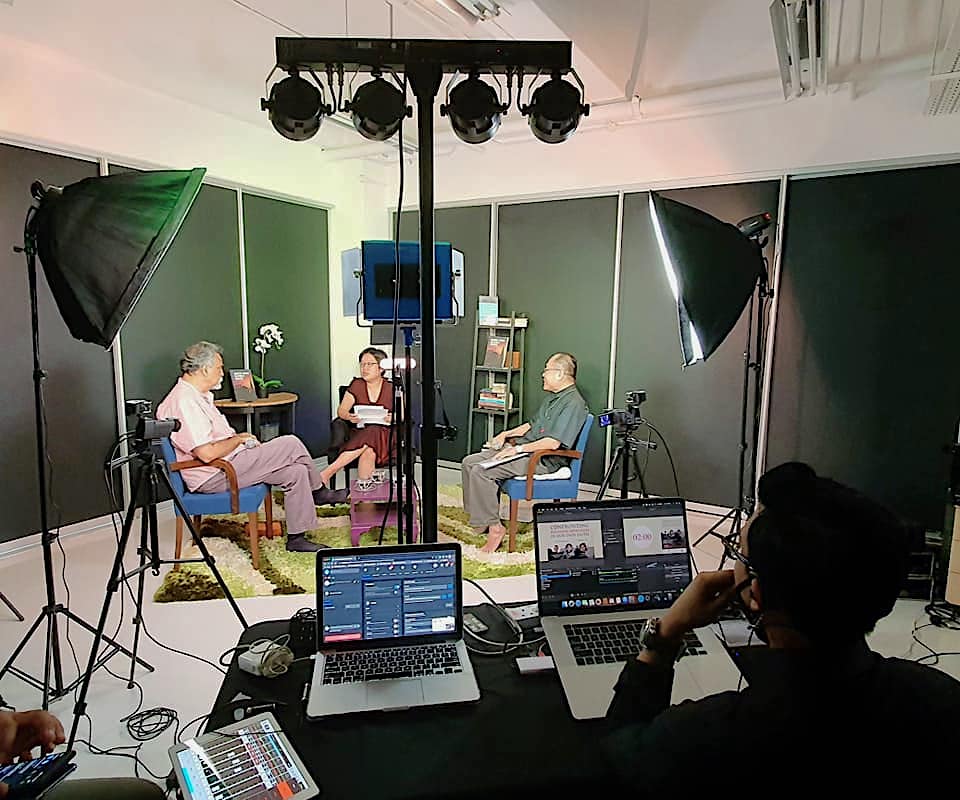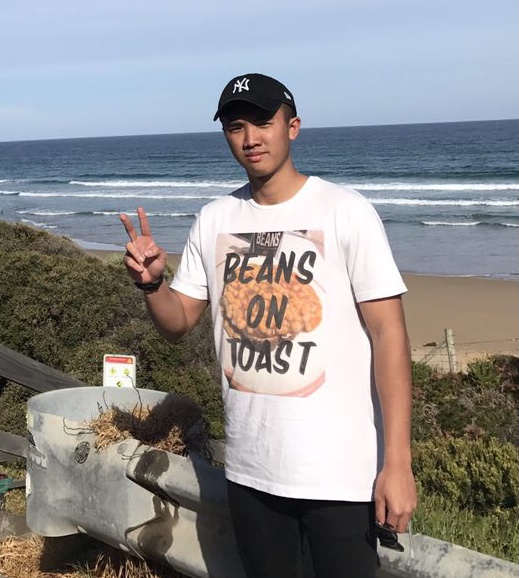“Conversion is not the end goal of dialogue, mutual understanding is”: Rev Dr Malcolm Tan on interfaith conversations
Silas Low // February 8, 2021, 2:44 pm

Behind the scenes of the online webinar on Feb 5, held over Facebook live by the Centre for Interfaith Understanding. Photo from CIFU Facebook page.
“We need to appreciate the humanity in each person, whether or not they know Jesus Christ.”
Rev Dr Malcolm Tan, Senior Pastor of Covenant Community Methodist Church, stressed this while speaking at the webinar, Confronting Religious Extremism in our own Faith, organised by the Centre for Interfaith Understanding on February 5.
Joining him on the panel was Syed Farid Alatas, Professor of Sociology at the National University of Singapore. The discussion was moderated by Kay Chew Lin, a board member of the Centre.
Organised in conjunction with the World Interfaith Harmony Week, the discussion was dominated by the news of the 16-year-old boy detained for planning to attack two mosques last month.
“That something like this has happened at home hopefully shakes us out of the complacency that this is not our problem,” said Kay, opening the discussion. “However much we say that our faith traditions advocate peace, we must acknowledge that peace needs constant maintenance on all our parts.”
It only takes one
There were no surprises about something like this happening, said Prof Syed.
Besides its calling to preach the Gospel, the Church must focus on “peace-building and being a good neighbour”.
Influences of non-physical extremism has always been around, he said, with the only question surrounding whether or not these extremist views would be acted upon.
All it takes is for “an individual prone to violence” to be inserted into an “extremist environment and orientation that might not even be physical”, for it to take a violent and dangerous form, he said.
Rev Dr Tan said that, while Christians believe that Jesus Christ is the Saviour of the world, this has not meant that an “adversarial relationship” has been taken with non-believers.
The local church understands its “cultural mandate” – that there must be a focus on “peace-building and being a good neighbour” besides its calling to preach the Gospel.
Friendships that build trust
Both panelists spoke about the role of inter-faith friendship in promoting understanding and peace, to quell inter-religious suspicion, especially in times like these.
Rev Dr Tan started with his own experience of engaging in close friendships with non-Christians, an intentional and genuine practice of building bridges.
“I ask God to give me the grace to relate to them in a positive way, for they also have the image of God.”
He also added that he only shares the Gospel with them if given permission to do so. There must be a balance of being true to what one believes in Scripture, but also acknowledging that none of us is God, and that our role is just to be “good witnesses to the best of our ability”.
“We can’t be close to people who merely tolerate us. We are close to people who love and trust us.”
Prof Syed echoed Rev Dr Tan’s sentiments on inter-faith friendships. Friendship invites conversation, he noted, which promotes understanding of other religions.
“The things we say have a profound effect on not only how we see the other person, but also their communities and religion,” he said.
Recounting a conversation that he had with a Protestant friend about salvation, Prof Syed had asked her if she thought he would be saved.
Her reply was one that he described as “beautiful”, as she said to him: “I do not want to be in heaven without my Muslim friends.”
That goes way beyond tolerance, he said. “We can’t be close to people who merely tolerate us. We are close to people who love and trust us.”
Comfortable with differences
Religious dialogue in Singapore is an area that can be improved, said both panellists.
Rev Dr Tan stressed the importance of a level of “social maturity” – an understanding that interfaith harmony and friendships can be maintained despite disagreements.
“Exclusivism becomes dangerous when one cannot see the humanity in others.”
He disagreed with theological relativism and the idea that “all of us are saying the same thing, albeit differently”.
Prof Syed said that “religious dialogue in Singapore has been too safe”, and that the focus has been too much on discussing commonalities between religions.
“We need to go beyond that, recognise the differences and be comfortable with these differences.
“We need to be brave and honest about our problems, and talk about religious extremism in our own communities, and with each other.”
Correct misinterpretations
“Exclusivism becomes dangerous when one cannot see the humanity in others,” said Rev Dr Tan.
While a Christian should hold onto the belief that Jesus Christ is the Saviour of the world, he cannot view the religious other as “sub-human” and “unloved by God”.
“When we proclaim the uniqueness of Jesus Christ, we must not lose sight of the humanity of any other person.”
Such a mindset is “un-Christlike”.
“When we proclaim the uniqueness of Jesus Christ, we must not lose sight of the humanity of any other person in this world.”
Prof Syed added that while exclusivism is an extreme attitude, it doesn’t necessarily translate into action.
The only way to prevent that translation is to engage in dialogue and discussions about these exclusivist views, he said.
If religious leaders claim to deny exclusivist views, they must seek to correct misrepresentations of other faiths, for instance, if Imams clarify that, in the case of the 16-year-old boy, “this might be the act of a Christian extremist, but it’s not representative of Christianity in Singapore”.
That has thankfully been the case with the Mufti of Singapore (the country’s highest-ruling Islamic authority) publicly affirming that the case was an “isolated incident and that the youth’s views are not representative of the Christian community here.”
Blessing of unity
Besides engaging in interfaith dialogues within communities, Prof Syed also expressed that dialogue must occur between the communities.
Explaining why the current depth and quality of dialogue still feels too “safe”, he surmised that the fear of critique from one’s own community could be the reason.
“Mutual understanding is a key ingredient in any good relationship.”
“If one promotes dialogue with other religions, some members of the community might feel that doing so will dilute and compromise on beliefs.”
Conversion is not the end-goal of dialogue, he said.
Instead, it is mutual understanding – a key ingredient in any good relationship.
Rev Dr Tan reaffirmed the importance of “the dialogue of life.” He noted that every day, Christians and Muslims share their lives talking to each other.
“That is more important than anything else. That is a blessing to the nation, when we live in harmony and unity.”
He also expressed a desire for interfaith dialogue to be “people honestly speaking about what they disagree on, in an environment that is safe, where friendships can still be preserved”.
Authentic in faith and neighbourliness
“We must treat the boy in love. We cannot ostracise him. Let’s be fair to him, we don’t know enough, so let’s not talk about him,” said Rev Dr Tan.
Prof Syed nodded in agreement.
The problem has to be pinpointed, said Prof Syed. Not the individual.
“We have to be authentic in our Christianity, and that means being authentic in being good neighbours in this country.”
“We need to be honest about where the different sources of extremism come from and talk about them,” he said.
He said that most of the influences come from overseas, and that the religious bodies in Singapore must compete with this “vast marketplace of theological and political ideas” and “must do a good job of doing so.”
“Let’s be brave to talk about extremism and handle it. Let’s seriously think about sticking to our roots of peace and harmony, and work towards that,” he said.
“The Church will need to teach more often about the ‘image of God’ in every person,” said Rev Dr Tan.
“That is a biblical truth that has to be taught and encouraged to be practised,” he said. “Not forgetting the story of the Good Samaritan (Luke 10:25-37), the religious ‘other’ that was a moral hero.”
Citing the need to stick to the Word, Rev Dr Tan said: “We have to be authentic in our Christianity, and that means being authentic in being good neighbours in this country.”
RELATED STORIES:
Alert authorities early if you notice signs of radicalisation in an individual: MCCY
Families more critical than ever in growing faith, fighting extremism
We are an independent, non-profit organisation that relies on the generosity of our readers, such as yourself, to continue serving the kingdom. Every dollar donated goes directly back into our editorial coverage.
Would you consider partnering with us in our kingdom work by supporting us financially, either as a one-off donation, or a recurring pledge?
Support Salt&Light




